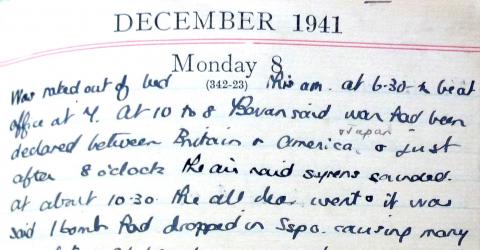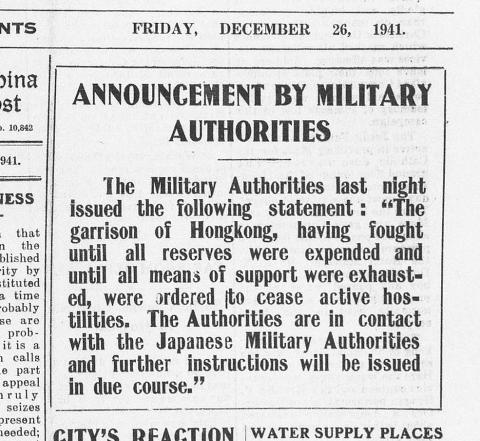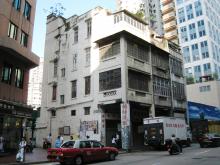79 years ago: Hong Kong's wartime diaries
Primary tabs
December, 1941.
79 years ago tensions were high as war with Japan seemed inevitable. On December 8th, those fears were confirmed when Japanese planes attacked Kai Tak, and Japanese soldiers crossed the border into the New Territories. The fighting continued until the British surrendered on Christmas Day.
The end of the fighting marked the beginning of the Japanese occupation, a time of great hardship for Hong Kong's residents. They would have to endure for three years and eight months, until the Japanese surrendered in August 1945, and Hong Kong was liberated shortly afterwards.
What was it like?
Let the people who lived through these times tell you themselves.
We've collected several wartime diaries, and split them into their day-by-day accounts. Each day we send out an email message containing all the diary entries written on that day, 79 years ago.
How to sign up to receive the daily messages?
Please click here to subscribe.
You'll see another screen that asks for your email address. Enter your details, hit the "Subscribe" button, then each day you'll receive an email message with today's diary entries.
It's free of charge, your details stay private, and you can unsubscribe at any time.
What do the daily messages look like?
Here are sample extracts from the messages you'll receive:
- 30 Nov 1941: "Topper says we are as near war now as we have ever been, that Japan with her militarist Govt. can't very well back down now."
- 1 Dec 1941: "Government advising further evacuation. Only hope seems to be that Japs now say they will keep on talks with USA in hope that USA will change viewpoint - that isn't thought likely."
- 7 Dec 1941: "There must be something in the wind, G.H.Q. staff are preparing to move into Battle HQ, a huge underground structure just behind the Garrison Sgts. Mess."
- 8 Dec 1941: "I started my birthday with a war. Kowloon bombed about 8AM."
- 10 Dec 1941: "Sid has been wounded. Bullet through shoulder. He told Hospital to phone Mum at the Jockey Club and she went to see him."
- 13 Dec 1941: "We hear rumours that the Mainland is being evacuated and that the Royal Scots, Middlesex Regt. and the Indian Regts. are fighting a rearguard action back to Kowloon."
- 14 - 15 Dec 1941: "Raids most of daylight hours, and shelling day and night.
Central Police Station bombed badly in afternoon, several killed. Felt the concussion even in the tunnel."
- 16 Dec 1941: "The 9.2 guns at Stanley and Mount Davis have been firing salvoes all day and all through the night, the noise is deafening. It keeps me awake most of the night so I was up at 4.30a.m. and got quite a bit of paperwork completed working behind a blacked out screen."
- 17 Dec 1941: "What a contrast from a week ago. Plenty of signs of bombing and shelling. Damaged buildings, wrecked cars and lorries everywhere. The tramline wires are strewn across the road. Some dead bodies lie about on the roadways and not a living soul in sight."
- 19 Dec 1941: "Hammond and Tuck stand guard outside while Kingsford and I and the Naval man enter the house. We find about 15 people wounded, mostly Naval men, some civilians, and two women, one a Chinese shot through the chest, the other a European was dead."
- 21 Dec 1941: "The Canadians are fighting a losing battle against the Japs on Stanley Mound, and the neighbouring peaks. The Japs have superiority in numbers."
- 23 Dec 1941: "We returned to the Exchange Building where Hammond, Edgar and I were joined by a Russian musician. He decided to take over the driving of the big Bedford van. We set off and ran into a series of shell explosions on the way. It was now obvious that the musician could not drive a wheelbarrow not to mind the Bedford, besides he was also shivering with fright. I tried to take over the wheel but he would not move over, and it was too dangerous to stop. However, we reached the Bakery which was up a very narrow passageway. He jammed the van in it so in the end I had to use the butt of my rifle to make him let go."
- 24 Dec 1941: "8.50PM heard the rattle of tanks on Island Rd as they approached the village (Jap). 2 knocked out by anti-tank gun & hell broke loose. Everything opened up on them & the Jap troops with them who were urged on by peculiar cries from their Commander."
- 25 Dec 1941: "While I was sitting on floor beside Sid, Mrs Johnson a friend who was helping the wounded, came over to us and said 'I have bad news for you - we've surrendered.' She was half-crying, and wouldn't look at us."
- 26 Dec 1941: "Although capitulation is not so good it feels nice to know that the likelihood of being shot or blown apart is gone."
- 8 Jan 1942: "Brushwood on hillsides [south] of Prison set alight today. Heard ammunition exploding."
- 9 Jan 1942: Captain Tanaka, at the time Japanese head of communications, gives permission to Thomas Edgar and other bakers to start making bread for the hospitals. They open the Chinese-owned Green Dragon (Ching Loong) Bakery in Wanchai. They are also allowed to bake for the Allied civilians in the hotels and later at Stanley. Barbara Anslow's diary establishes that the bread - one slice for each internee - began to arrive on January 12.
- 19 Jan 1942: "Fire opposite us in the night - very near thing. There were just sooty sparks at first, but later the fire really got going. All the gongs in the neighbourhood were beating as alarms, several huge tongues of fire blew over in our direction."
- 21 Jan 1942: "In morning, we were given a quarter of an hour to pack and get out of the hotel, then marched down Des Voeux Road. Then boarded top-heavy Macau steamer and set out for Stanley. It could have been lovely - such a beautiful day. Our boat too big to go right up to the jetty at Stanley, so we had to clamber over the side of the ferry on to the side of the junk - then jump into the body of the junk. Poor Mrs Grant who weighed over 15 stone, cried from the side of the ferry that she just couldn't make the transfer, but somehow she did."
Please click here to subscribe, and start receiving daily diary entries by email.
What do previous subscribers to the Wartime Diaries say about them?
This is the 10th year we'll run this project. Here are comments from some of the readers who subscribed in previous years. They are located all around the world, and have many different reasons for subscribing:
-
My father and uncle were interned in Sham Shui Po and Argyle Street camps. My grandfather, aunt and cousin were interned in Stanley camp. I have a keen interest in the history of that time.
Once you know HK it’s fascinating to understand the flow of the battle for Hong Kong and the aftermath that extended into 3 years and 8 months of incarceration for foreign nationals of the allied cause and a very tough life for others that had to exist in perilous times with dwindling food and an oppressive occupying force.
Glenn Smith -
I read the emails practically daily. The suspense of what would happen and what would be shown tomorrow keeps my interest in reading the "once a day reports" everyday.
Tai Hang Wong, Mississauga, Canada. -
I rarely miss a day and the reason is I think is partly the scale of the information and partly the serial format. Because the description are, by definition, excerpts, they are quick to read. By reading them regularly, I have become invested in the characters.
What has fascinated me most I think is the information that the internees are getting in camp. Some seems speculative, but they seem to be getting some reasonably accurate information on the Solomon and Libyan Campaigns. Their Eastern Front info seems a little more vague. I like the varying sources and perspectives in the short format.
Neil Williams -
What keeps me interested in reading the daily diary entries is that they give me what feels like an authentic connection with the everyday lives of the people even though it feels like reading a series of telegrams. Both of my parents grew up in Hong Kong and Macau in the 20s and 30s and had already arrived in Australia while many of their school friends (Zimmern, Broadbridge, Hunt) remained in Hong Kong. These entries give me some insight into their lives during the occupation.
The entries have acted as prompts to research diverse aspects of the history of the occupation. For example mention of hidden wireless receivers had me researching stories and more background about the people, the radios, the programs and the punishments if discovered. I am fascinated by how much information managed to flow into and around the community, especially about the progress of the war.
Stephen Rapley, Sydney -
My father was in Hong Kong with the RN in 1945. Myself and my dad walked around Hong Kong swapping tales for years before he died, so your reports (especially of after liberation) are of significant importance and interest to me. I relate to them in many ways. It helps me retain the link to that era. One that is personally important to me.
Les Bird - I read most days, mainly from an interest in the life of Barbara and her family and the background extracts from other sources. It is different from reading a book on the subject - the emails are interesting personal experiences which may be unique to the authors.
Jeff -
I read the daily messages because I was born during the war in Macau where my British parents had taken refuge. The rest of the relatives were interned in Stanley.
Antoinette Gordon, Los Angeles -
I read the emails every day & daily if I am at home or as soon as possible. I love military history, especially WW2, & even more so about Hong Kong having lived there twice & my father, my wife & I having all served there in the Army.
The once a day format is clever because it takes the pace & rhythm of what it was like for those who went through it. It makes it easier to imagine what it must have been like for the captives living with the day to day of not knowing what will happen. You also can’t cheat & find out what happened out of sequence.
It is a wonderful confirmation of the endurance & determination of people to never give up.
GHW -
I read every single one. I’m interested because I was stationed in Hong Kong in 1958/60 during Regular Army Service. The best experience of my life, bar none. What a place !
I enjoy the “once a day” format, and the messages open your eyes to things that were happening on the other side of the world during Japanese occupation and how human behaviour can “seesaw”.
Colin Cobb -
I read them most days, and I look out for any mentions of Hong Kong Police. Reading these emails helps the reader to obtain a greater sense of vicarious experience.
Andrew Hill -
I think the daily email format is a great idea, at least I could keep reading. This part of history is something we shouldnt forget.
Jason Ng from Hong Kong, now at Birmingham -
I’m reading them almost daily because I find it interesting to read diary entries from times long ago. Sometime when I’m short in time I spare them for the weekend and read all of them in a row. I personally like more to spend a minute a day in the past than to read a book that would take hours.
Klaus Liphard -
I read them most days, as I like to be reminded of what my family went through there. The daily email is not as daunting or time consuming as reading a book - it is so interesting and well worth the few moments to read it daily.
Marjorie Elston, Canada
Thank you!
Thank you to the subscribers for letting me post their feedback. Also thanks to everyone who has contributed diary material to this project and helped with typing and posting the material. Finally, special thanks to Alison, Barbara, Brian, and Tony, who got us started:
- Alison McEwan typed up the R E Jones' diary, made it available via the Stanley Camp discussion group, and then allowed it to be used in this project. (Alison's father Colin McEwan was one of the members of the group described in her husband Tim Luard's book: Escape from Hong Kong: Admiral Chan Chak’s Christmas Day Dash, 1941.)
- Barbara Anslow lived in Hong Kong in the 1940s, and was interned in the Stanley Camp. Barbara very generously shared her diary with us, and added to it over the years with many comments and explanations. Sadly, Barbara passed away in 2019.
- Brian Edgar has already shared details of his father's time in Hong Kong during the fighting and occupation. He's also doing a great job of adding commentary to the daily messages, based on his extensive research into this period.
- Tony Banham is the local expert on Hong Kong during the fighting and occupation. He has written several books about the topic, and the timeline approach he's used so successfully is the inspiration for this project.
Are there more diaries out there?
I hope we can add more diaries, to get a broader range of viewpoints. If you know anyone who has family diaries covering Hong Kong between 1941-1945, please could you ask if they are willing to share them with us?
Thanks & regards,
David
PS That subscription link one last time - please click here to subscribe.



